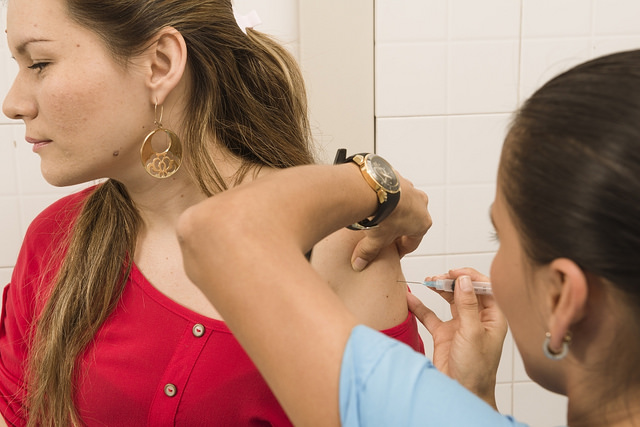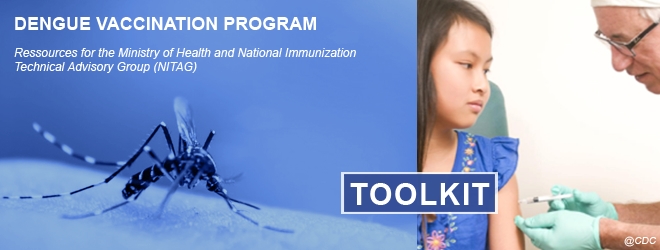- by Gary Finnegan
Dengue vaccination toolkit hopes to boost introduction
A new dengue vaccination toolkit offers a guide to introducing the dengue vaccine, tackling everything from vaccine delivery to ‘rumor management’
Introducing a new vaccine is a complex task. Not only must health authorities consider how they will reach the target population and who will administer the vaccine, new systems must be developed to monitor impact and track any safety issues. Add to that the need to communicate about the value of an immunization program – and counter the misinformation that might be circulated online by anti-vaccine activists – and this is clearly a major challenge.

Credit: Sanofi Pasteur / Industria Fotográfica Estudio Base
For new childhood vaccines that fit into an established pediatric immunization schedule, some of these hurdles are more easily cleared. Key infrastructure is already in place: doctors and nurses are used to inviting parents to bring their children for their shots, and most parents are happy to protect their kids against killer viruses and bacteria.
The first dengue vaccine to be licensed – known as DENGVAXIA® – is not indicated for infants. In fact, the youngest target group begins at nine years of age.
These unique characteristics make introducing the vaccine more complex and may even discourage some governments from rolling out the jab. New solutions needed
New solutions needed
Step forward, Agence de Médecine Préventive (AMP), a Paris-based NGO with scientific and technical expertise in vaccination. Vaccinology specialists at AMP Services have developed a dengue vaccination program toolkit which includes a series of training modules, a case study library and interactive tools to help health authorities to add the vaccine to their anti-dengue arsenal.
Currently available in English, Spanish and Portuguese, the toolkit will be of use to the 13 countries in which the vaccine is licensed – Mexico, the Philippines, Brazil, El Salvador, Costa Rica, Guatemala, Paraguay, Indonesia, Peru, Cambodia, Thailand, Singapore, and Bolivia – and in others where the vaccine is being considered.
Dr. Isabelle Delrieu, Scientist and Project Leader at AMP Services, says her team has been working on the toolkit for one year with support from Sanofi Pasteur, the company that developed Dengvaxia®.
“Given the increasing burden of dengue infection and disease worldwide, the dengue vaccine has great potential to have a significant impact in terms of disease reduction and prevention of dengue outbreak,” she said. However, she noted that technical aspects of the vaccine such as the three-dose schedule given six months apart over a 12-month period in the teenage and adult population – require a unique approach.
Dr. Delrieu said that the toolkit is not an advocacy tool but an operational handbook for countries that have decided to embrace vaccination. “Each country has its own epidemiological and organizational context. Rather than promoting a ‘one size fits all’ solution, the toolkit is linked to a case study library aimed at reflecting the range and diversity of thoughts and solutions.”
National decision-makers and immunization program stakeholders are the target audience for the resources developed by AMP Services: “This includes staff from the Ministry of Health, NITAG members, but also – for some specific modules – Ministries of Education, Economics, and so on.”
The toolkit already includes seven modules and an interactive tool providing information on several topics:
- information on the dengue vaccine
- implementation strategies
- organization of vaccination sessions
- impact evaluation
- pharmacovigilance
- dengue outbreak and evaluation
- diagnosis strategies in the context of vaccination
Modules on dengue vaccine communication, rumor management, and social mobilization are currently under development. An interactive companion Excel tool has been developed with the objective to help decision makers in summarizing their country data and evaluating possible introduction areas, implementation, and evaluation strategies.
The case study library is regularly updated based on country experiences, according to Dr. Delrieu. “The toolkit is regularly enhanced and updated with feedback from country consultations, international meetings and experts’ insights, World Health Organization (WHO) recommendations, international organizations’ reports, and scientific literature,” she said.

Rumor has it
Communication issues and rumor management are becoming a major concern when implementing new health interventions. This is particularly true for new vaccines, which are given to a healthy population.
“Together with a pharmacovigilance system, it is also important to summarize and explain the scientific data from the trials, and emphasize the necessity to prepare accurate communication plans regarding dengue vaccine and its use in the context of routine immunization and outbreak response,” says Dr. Delrieu. “Communication, including COMBI – Communication for Behavioral Impact – and social mobilization are compulsory components of a vaccine introduction strategy.”
She said communication programs should be implemented at various levels, including in the community, with healthcare workers, clinicians, NGOs members, but also other staff and stakeholders involved in vaccine implementation such as teachers.
In addition to practical information on vaccine implementation, communication should also address and disseminate technical topics such as the real public health impact of the vaccine.
Paving the way
Dengvaxia® is the first and, currently, the only vaccine against dengue. Its implementation will be crucial to how dengue vaccination is viewed in general. The Dengue Vaccine Program Toolkit is essential to overcoming the many logistical and public perception issues that come with rolling out a new vaccine.
The good news is that monitoring and evaluation systems, as well as public communication and professional training programs, that are introduced now will make it easier to combat dengue and other arboviruses such as Zika, chikungunya, yellow fever, and Japanese encephalitis.
Get the dengue vaccination toolkit

